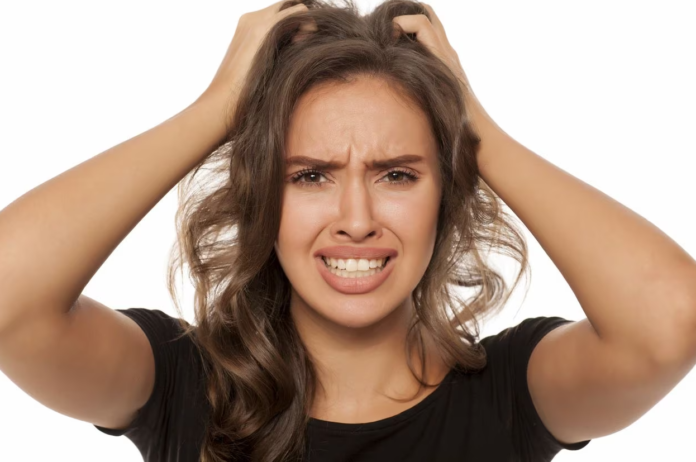
Welcome to your treasure trove of hair health secrets, where expert advice from dermatologists, trichologists, and hairstylists merges with science-backed solutions. Today’s mission? Tackling that pesky problem that has had us all scratching our heads—literally. An itchy scalp.
We’ve all experienced it—that maddening itch that sends our fingers scurrying to our heads, subtly during a video call or passionately when we’re alone. This minor discomfort can quickly escalate into a significant annoyance, almost like a relentless fly buzzing around you during meditation. But fear not, ladies! Help is at hand.
So, what’s causing this scalp irritation? Is it that new trendy shampoo? A stealthy sign of stress? Or could it be something a little more serious, like psoriasis? We’ve teamed up with board-certified dermatologist Dr. Anna Chacon to unpack this itchy enigma, highlight the common culprits, and present you with potential solutions.
Dr. Chacon explains that an itchy scalp, scientifically termed ‘scalp pruritus’, can be incited by several factors. “Conditions such as dandruff and seborrheic dermatitis, typically caused by yeast overgrowth on the scalp, are among the most common itch inducers,” she says. But the triggers aren’t always so commonplace. Psoriasis, an autoimmune condition resulting in red, itchy, scaly patches on the scalp, can also ramp up the itch factor. Then there’s contact dermatitis, usually an allergic reaction to hair products, like your beloved shampoo or hair dye. And yes, if it feels like an insect rave on your scalp, head lice could be the culprits.
Dr. Chacon underscores the significance of being savvy about what we’re using on our hair. It can be a bitter pill to swallow when we discover that the hair products we love might be worsening the situation. Several common ingredients, like sulfates, parabens, alcohol, synthetic fragrances and dyes, and propylene glycol, can exacerbate itchiness, particularly for those with sensitive skin or pre-existing scalp conditions. She recommends being mindful of product labels and conducting patch tests before using new products.
However, some itchy scalp triggers lurk in our environment. Factors like dry climates, pollution, and hard water can worsen the itch. And don’t underestimate the power of stress—it’s not just mental but can amplify physical discomforts, such as an itchy scalp, says Dr. Chacon.
So, how can we tame the itch? Relief can come in many forms: medicated shampoos, topical steroids, antihistamines, and antibiotics or antifungal treatments. But remember, while these treatments can be quite effective, they can also come with side effects, so always follow your healthcare provider’s advice.
A good routine is your first line of defense against a troublesome scalp. Regularly shampooing your scalp, choosing hypoallergenic, fragrance-free, and gentle hair products can make a world of difference. And maintaining good scalp health isn’t just about haircare. Drinking lots of water, eating a balanced diet, and managing your stress levels can also help alleviate an itchy scalp and foster a healthy scalp environment.
Despite your best efforts, if the itch persists for more than a week, is severe, or is accompanied by symptoms like hair loss, sores, or a rash, it’s time to call in the pros. “Don’t ignore the itch—reach out to a dermatologist who can help you get to the root of the problem,” advises Dr. Chacon.
Remember, our bodies are constantly talking to us. Ignoring an itchy scalp can be like turning a deaf ear to a fire alarm while the fire blazes on. Listen to your body, respond to its needs, and relish the bliss of an itch-free life!










